-
ORIGINAL ARTICLE12-04-2023
“Fala-M@no-COVID-19”: technological development of a health navigation program for men during the pandemic
Revista Brasileira de Enfermagem. 2023;76(6):e20220534
Abstract
ORIGINAL ARTICLE“Fala-M@no-COVID-19”: technological development of a health navigation program for men during the pandemic
Revista Brasileira de Enfermagem. 2023;76(6):e20220534
DOI 10.1590/0034-7167-2022-0534
Views0See moreABSTRACT
Objective:
to develop a care-educational technology similar to a health navigation program for men during the COVID-19 pandemic.
Methods:
a methodological and qualitative study of a care-educational technology of health navigation program, structured by Program Development Cycle, with 16 patient navigators and 10 professional navigators. It used reflective thematic content analysis and an adaptation model for data processing.
Results:
the ; navigation program was developed by: I) Observation of reality, problem mapping, needs assessment: content selection, creation of domains and questions; II) Theoretical-conceptual and methodological definition, creation of product under the elaboration of care plans, based on theory, process and taxonomies by a flowchart of operationalization of actions; and III) Self-assessment: qualitative research with professional navigators.
Final considerations:
the technology developed, with theoretical and methodological support, allowed to derive a viable navigation program compatible with reality based on the audience’s needs.
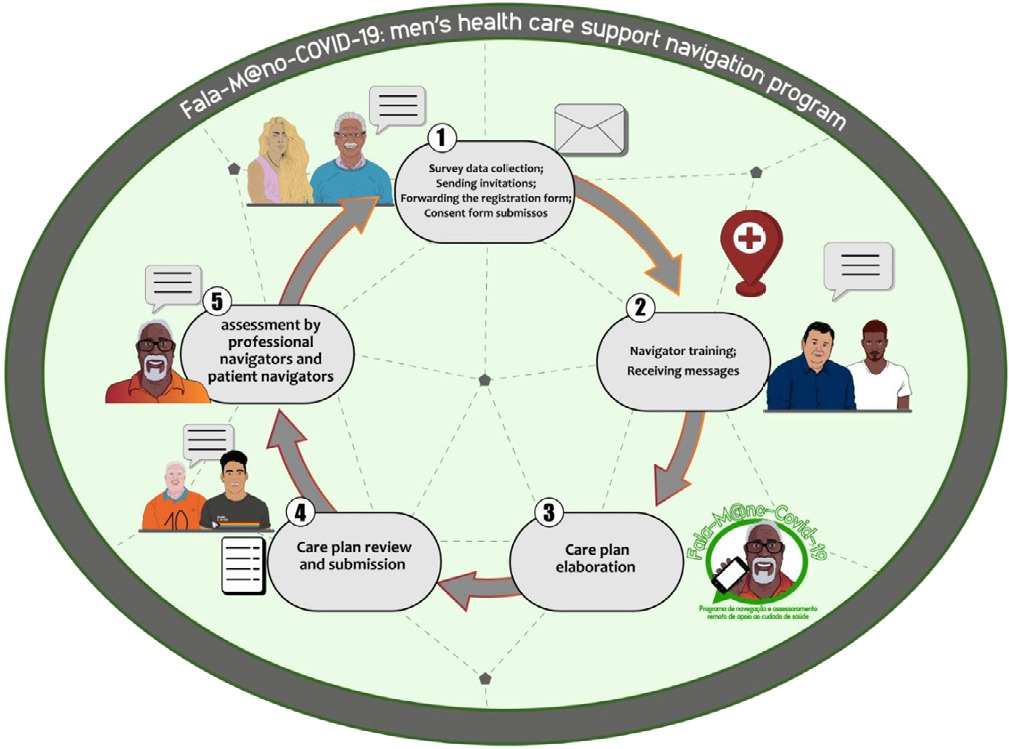
-
ORIGINAL ARTICLE12-04-2023
Social representation of young people in higher education about sexually transmitted infections
Revista Brasileira de Enfermagem. 2023;76(6):e20220406
Abstract
ORIGINAL ARTICLESocial representation of young people in higher education about sexually transmitted infections
Revista Brasileira de Enfermagem. 2023;76(6):e20220406
DOI 10.1590/0034-7167-2022-0406
Views0See moreABSTRACT
Objective:
to analyze the social representations about sexually transmitted infections elaborated by undergraduate students.
Methods:
a descriptive, qualitative study, in the light of the structural approach of Social Representation Theory, carried out with 160 young undergraduate students, in the second half of 2019, in the city of Rio de Janeiro. Data were collected using a sociodemographic characterization questionnaire, knowledge and practices for preventing sexually transmitted infections, analyzed using descriptive statistics and a form of free evocations with the inducing term STD, analyzed using prototypical and similarity analysis.
Results:
the representation’s possible central nucleus is composed of lexicons aids, disease and HIV; the peripheral system by syphilis, sex, condoms, gonorrhea, prevention, infection, carelessness, HPV, herpes, ignorance, treatment, fear, unprotected-sex and danger.
Final considerations:
social thinking about sexually transmitted infections is characterized by their recognition as diseases, which require barrier prevention measures, associating with unsafe sexual practices that arouse fear.

-
12-04-2023
The Medical Healing of Souls: a strategy for welcoming post-pandemic mental health
Revista Brasileira de Enfermagem. 2023;76(6):e20220331
Abstract
The Medical Healing of Souls: a strategy for welcoming post-pandemic mental health
Revista Brasileira de Enfermagem. 2023;76(6):e20220331
DOI 10.1590/0034-7167-2022-0331
Views0See moreABSTRACT
Objective:
to reflect on the applicability of the Medical Healing of Souls (MHS) by health professionals as a welcoming strategy in post-pandemic mental health.
Methods:
a theoretical and reflective study, based on Viktor Frankl’s philosophy, based on the book “The Doctor and the Soul, From Psychotherapy to Logotherapy” and scientific literature.
Results:
the study was structured in two discursive approaches: MHS in the field of health; The applicability of MHS in post-pandemic mental health care.
Final considerations:
MHS can be used in mental health care, in health emergencies, promoting a more humane performance of health professionals, facilitating the integration of inevitable suffering into a meaningful life.
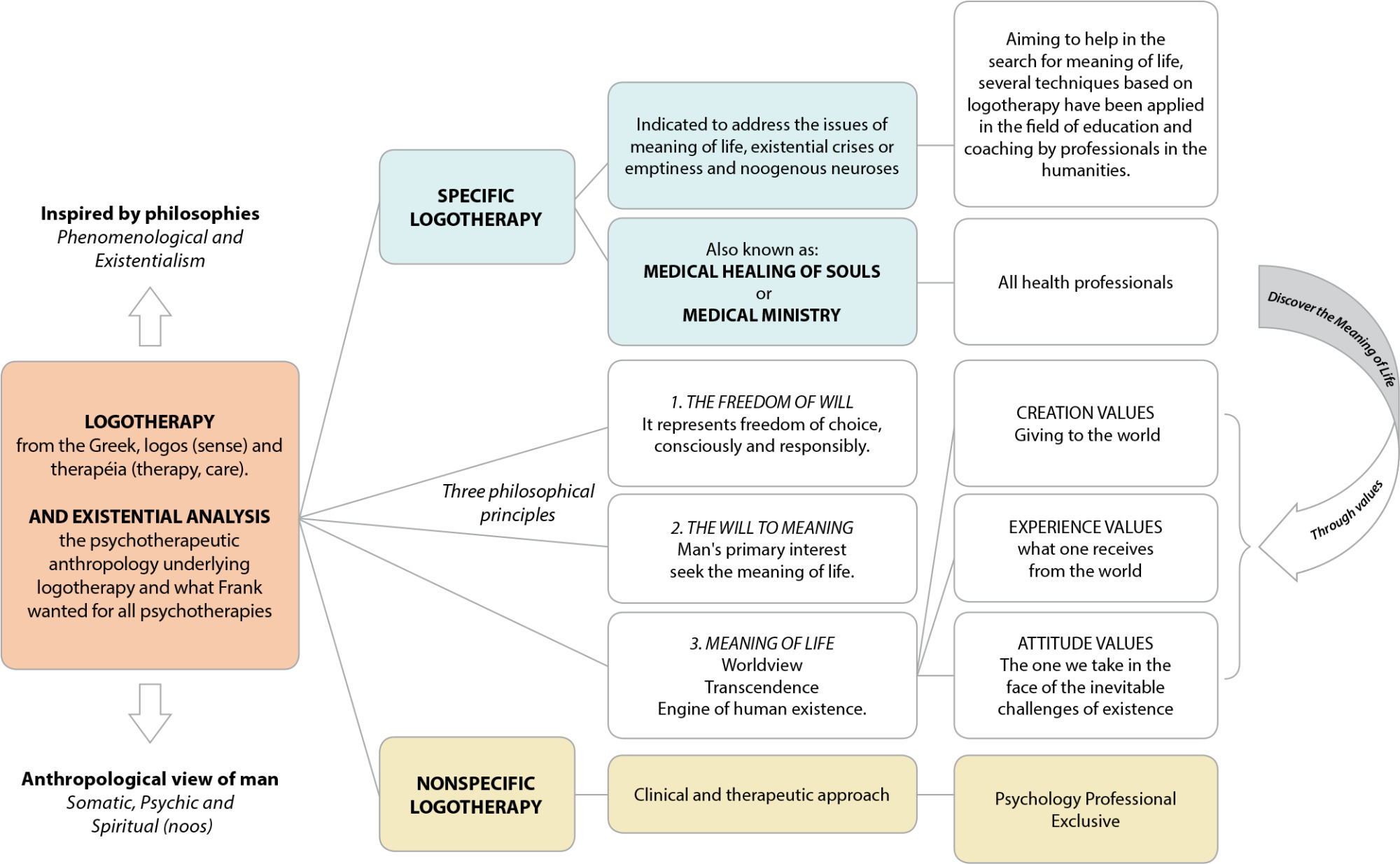
-
ORIGINAL ARTICLE12-04-2023
Translation, cross-cultural adaptation and validity study of the “Play Nicely Program: The Healthy Discipline Handbook” for use in Brazil
Revista Brasileira de Enfermagem. 2023;76(6):e20220281
Abstract
ORIGINAL ARTICLETranslation, cross-cultural adaptation and validity study of the “Play Nicely Program: The Healthy Discipline Handbook” for use in Brazil
Revista Brasileira de Enfermagem. 2023;76(6):e20220281
DOI 10.1590/0034-7167-2022-0281
Views0See moreABSTRACT
Objective:
to describe the translation, cross-cultural adaptation and validity process of the “Play Nicely Program: The Healthy Discipline Handbook” for use in Brazil.
Methods:
a methodological study that followed the translation, back-translation, expert committee assessment, and pre-test steps. The Content Validity Index (CVI) was calculated for both the judge population and the pre-test population. Four translators, seven expert judges in the field of child health and thirty participants in the pre-test, including parents, teachers and healthcare professionals, participated in the study.
Results:
in experts’ analysis (98.4%), a value of 100% of adequate assessments was obtained, and in the target population’s analysis (89.5%), there were 100% of adequate assessments. In both analyses, suggested adaptations were made.
Conclusios:
cross-cultural adaptation and content validity into Brazilian Portuguese of the “Play Nicely Program: The Healthy Discipline Handbook” were considered adequate for application in the target population.

-
ORIGINAL ARTICLE12-04-2023
Assessment of the components of sarcopenia and quality of life perceived of individuals on hemodialysis
Revista Brasileira de Enfermagem. 2023;76(6):e20220677
Abstract
ORIGINAL ARTICLEAssessment of the components of sarcopenia and quality of life perceived of individuals on hemodialysis
Revista Brasileira de Enfermagem. 2023;76(6):e20220677
DOI 10.1590/0034-7167-2022-0677
Views1See moreABSTRACT
Objectives:
to evaluate the prevalence of sarcopenia in individuals aged 50 years or older on hemodialysis; to verify the association between sarcopenia and sociodemographic, clinical, anthropometric factors, components of sarcopenia and quality of life (QoL); and to correlate the components of sarcopenia with QoL.
Methods:
Participated 83 individuals on hemodialysis. Sarcopenia was established according to the current European consensus. Dynamometry to determine strength, calf circumference (CC) and appendicular skeletal muscle mass index (ASMMI) to obtain muscle mass and gait speed (GS) for physical performance. For QoL used the WHOQOL-bref.
Results:
the prevalence of sarcopenia was 32.6% (CC) and 18.1% (ASMMI). There was no association between sarcopenia and QoL. Both handgrip strength (r=0.25) and GS (r=0.36) showed a correlation with physical domain.
Conclusions:
sarcopenia was expressive, and the aspects of functionality determine the physical impairment in this population.
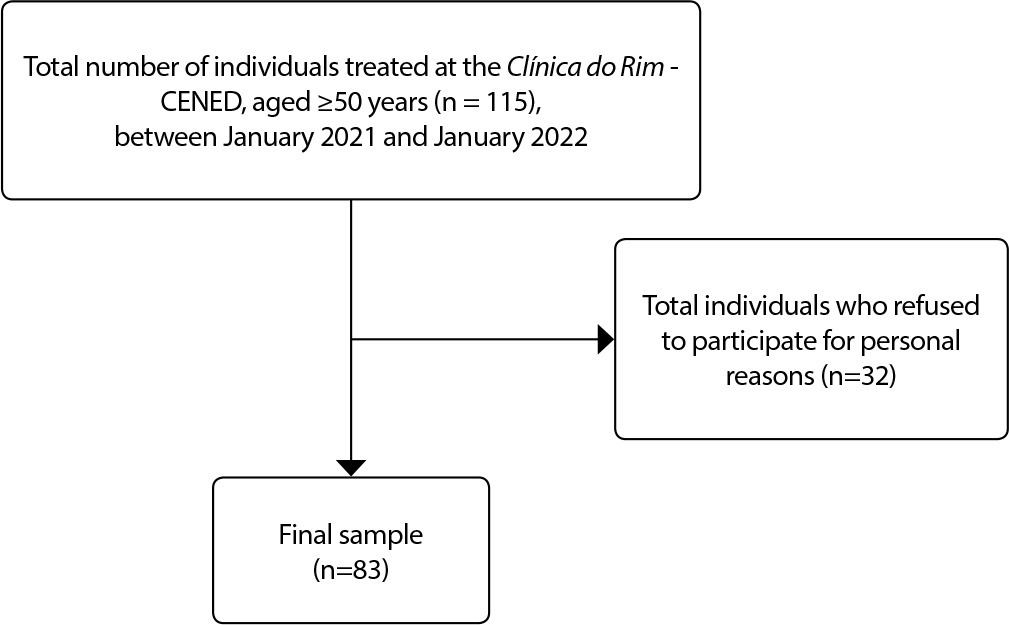
-
ORIGINAL ARTICLE12-04-2023
Effects of auriculotherapy on anxiety and biomarkers in Primary Health Care: a clinical trial
Revista Brasileira de Enfermagem. 2023;76(6):e20220728
Abstract
ORIGINAL ARTICLEEffects of auriculotherapy on anxiety and biomarkers in Primary Health Care: a clinical trial
Revista Brasileira de Enfermagem. 2023;76(6):e20220728
DOI 10.1590/0034-7167-2022-0728pt
Views0See moreABSTRACT
Objective:
to assess the effects of auriculotherapy on anxiety and brain-derived neurotrophic factor (BDNF), neuron-specific enolase (NSE) and S100 calcium-binding protein B (S100B) serum levels in adults assisted in Primary Health Care.
Methods:
a pre-experimental pilot clinical trial. Information was obtained from 19 patients using the State-Trait Anxiety Inventory (STAI) and analysis of BDNF, NSE and S100B serum levels.
Results:
the pre-intervention anxiety score in the IDATE-Trait was 52.11±6.691 (CV 12.84%) and the assessment after auriculotherapy was significantly lower (43.72±8.141; CV 18.62%; P=0.0007). S100B levels were significantly reduced after auriculotherapy (from 64.03±72.18 to 54.03±68.53 pg/mL; CV 126.8%; P=0.0023).
Conclusion:
auriculotherapy effectively reduced anxiety levels. It proved to be safe and easy to apply, allowing nurses to perform this technique autonomously. A reduction of S100B was also evidenced, demonstrating possible prevention of neuronal damage.
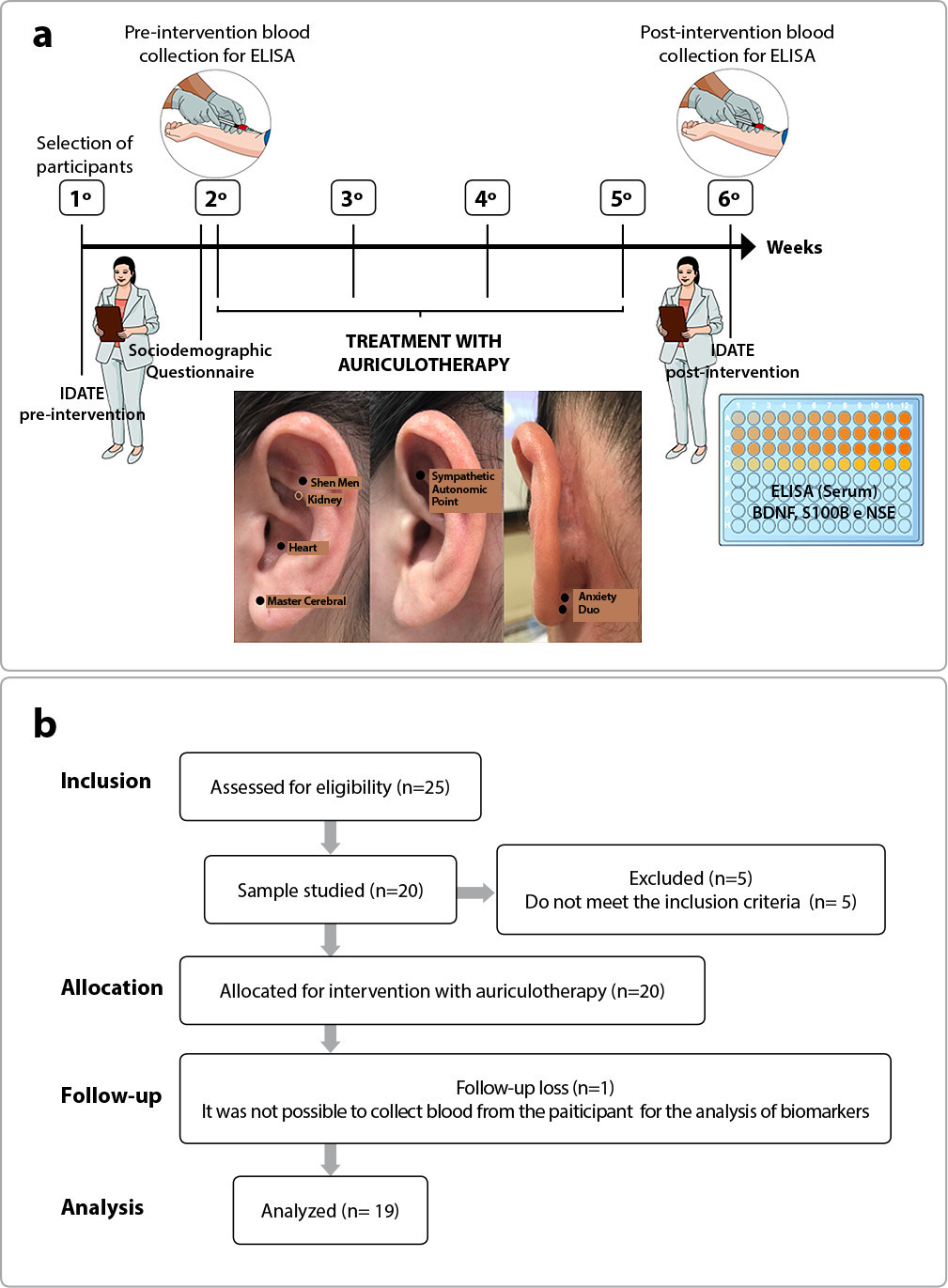
-
ORIGINAL ARTICLE12-04-2023
Leadership Competencies of the Medical-Surgical Nursing Specialist Nurse
Revista Brasileira de Enfermagem. 2023;76(6):e20220721
Abstract
ORIGINAL ARTICLELeadership Competencies of the Medical-Surgical Nursing Specialist Nurse
Revista Brasileira de Enfermagem. 2023;76(6):e20220721
DOI 10.1590/0034-7167-2022-0721
Views0See moreABSTRACT
Objective:
To identify the leadership competencies of Medical-Surgical Nursing Specialist Nurses.
Methods:
A quantitative, descriptive study using the Leadership Competencies Questionnaire. 311 Portuguese Medical-Surgical Nursing Specialist Nurses participated. Data analysis involved descriptive and inferential statistical analysis using the Statistical Package for Social Sciences (SPSS), version 22.0.
Results:
Study participants had an above-average self-perception on the scale (mean = 3.5) in all leadership roles, recognizing their leadership competencies. The leadership competencies of Medical-Surgical Nursing Specialist Nurses are balanced across all roles: Mentor (5.80 ± 1.02); Coordinator (5.53 ± 0.86); Facilitator (5.38 ± 1.04); Innovator (5.34 ± 0.88); Director (5.31 ± 1.10); Producer (5.30 ± 0.98); Monitor (5.15 ± 1.00); Corrector (4.79 ± 1.29)
Conclusions:
Specialized nursing practice enhances nurses’ self-perceived leadership competencies. Nurses see themselves as leaders focused on internal support and facilitation of collective effort and opportunities for skill development.
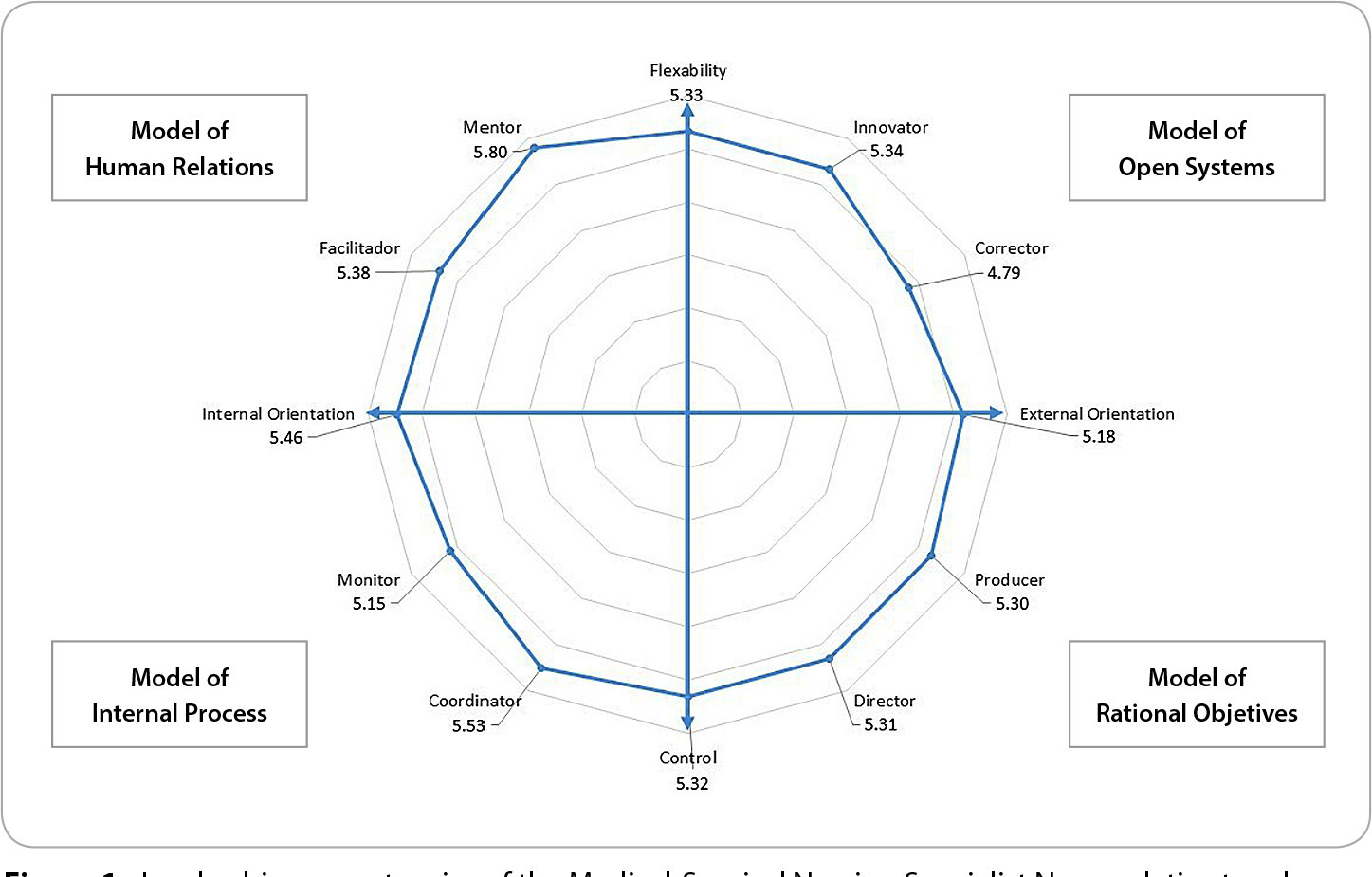
-
ORIGINAL ARTICLE12-04-2023
Feelings about birth by a group of high-risk pregnant women
Revista Brasileira de Enfermagem. 2023;76(6):e20230059
Abstract
ORIGINAL ARTICLEFeelings about birth by a group of high-risk pregnant women
Revista Brasileira de Enfermagem. 2023;76(6):e20230059
DOI 10.1590/0034-7167-2023-0059
Views0See moreABSTRACT
Objective:
to understand feelings about birth among a group of high-risk pregnant women.
Method:
a descriptive and qualitative study, using Alfred Schütz’s social phenomenology as a philosophical theoretical framework. The study included 25 pregnant women undergoing high-risk prenatal care. The interview had the following guiding questions: tell me about your feelings regarding the moment of birth/childbirth; How do you deal with the high-risk diagnosis? What are your expectations for birth/childbirth?
Results:
five categories emerged: Fear of obstetric care; Fear of complications with the baby; Fear of cesarean section; Resilience in the face of high-risk pregnancy; and Expectations for birth.
Considerations:
high-risk pregnant women are afraid of the care they will receive, the risks and concern about the baby’s vitality at birth. The importance of care is emphasized, with a welcoming environment, bonding and communication between health team and pregnant woman.
-
EXPERIENCE REPORT01-01-2018
Clinical and epidemiological teaching of dengue through simulated practice
Revista Brasileira de Enfermagem. 2018;71(2):451-456
Abstract
EXPERIENCE REPORTClinical and epidemiological teaching of dengue through simulated practice
Revista Brasileira de Enfermagem. 2018;71(2):451-456
DOI 10.1590/0034-7167-2016-0503
Views2See moreABSTRACT
Objective:
to describe the experience of clinical teaching on dengue and the practice of epidemiological surveillance using problematization methodology.
Method:
report of experience on educational activity with undergraduate nursing students, held in March 2016, at a public university in the city of São Paulo, conceived in four stages: dialogic lecture, active search of Aedes aegypti, case study and simulation of nursing consultation to individuals with dengue.
Results:
The activity allowed to retrieve previous knowledge about the disease, respond to exercises that addressed different clinical situations and epidemiological surveillance, including in situ evaluation of possible mosquito outbreaks, and discuss the need to expand prevention and health of the individual and the community, the impact of the media in the dissemination of cases and the coping difficulties experienced in the different levels of attention.
Conclusion:
the methodology adopted enabled qualified training of students to cope with dengue.

-
ORIGINAL ARTICLE07-18-2022
Beliefs, knowledge, actions of nursing techniques in breastfeeding in pain management in immunization
Revista Brasileira de Enfermagem. 2022;75(6):e20210546
Abstract
ORIGINAL ARTICLEBeliefs, knowledge, actions of nursing techniques in breastfeeding in pain management in immunization
Revista Brasileira de Enfermagem. 2022;75(6):e20210546
DOI 10.1590/0034-7167-2021-0546
Views1See moreABSTRACT
Objective:
Understand the beliefs, knowledge, and actions of nursing technicians on breastfeeding as a form of non-pharmacological intervention to relieve pain in newborns and infants during immunization.
Methods:
Qualitative study carried out through semi-structured interviews with nine nursing technicians from three Basic Health Units in a city in the state of São Paulo. The theoretical approach of the Belief Model and the methodological framework of Thematic Analysis supported this study.
Results:
Three themes originated: Beliefs, Knowledge, and Actions of nursing technicians.
Final considerations:
Despite knowledge about the benefits of breastfeeding as the most effective method for relieving pain in newborns and infants during vaccination, their restrictive beliefs overrode the evidence, leading them to act in ways that discourage or prevent the mother from breastfeed during vaccination. Formal training is recommended to align with current evidence-based practices.
-
REVIEW12-08-2023
Educational technologies for accident prevention due to falls in childhood: a scoping review
Revista Brasileira de Enfermagem. 2023;76:e20220807
Abstract
REVIEWEducational technologies for accident prevention due to falls in childhood: a scoping review
Revista Brasileira de Enfermagem. 2023;76:e20220807
DOI 10.1590/0034-7167-2022-0807
Views2See moreABSTRACT
Objectives:
to map evidence on educational technology use for accident prevention due to falls in childhood.
Methods:
a scoping review, carried out in October and November 2022, in the MEDLINE, Web of Science, BDENF and CINAHL databases and LILACS bibliographic index. There was no delimitation of language or time. Data were extracted and analyzed descriptively by two independent researchers. The research protocol was registered in the Open Science Framework.
Results:
twenty-six studies were selected. Booklets, pamphlets and leaflets were the most used technologies, presenting health services as the most frequent environment to develop research on fall prevention. The technologies developed were important outcomes: increased knowledge of children, family members, caregivers, health and education professionals.
Conclusions:
educational technology use makes it possible to increase knowledge, adopt safe practices and reduce falls.

-
REVIEW03-15-2024
Resources for health literacy among caregivers of prematurely born children: a scoping review
Revista Brasileira de Enfermagem. 2024;77(1):e20230062
Abstract
REVIEWResources for health literacy among caregivers of prematurely born children: a scoping review
Revista Brasileira de Enfermagem. 2024;77(1):e20230062
DOI 10.1590/0034-7167-2023-0062
Views1See moreABSTRACT
Objectives:
to map the available evidence on resources used to promote health literacy among caregivers of prematurely born children during outpatient follow-up.
Methods:
the Joanna Briggs Institute’s scope review protocol was utilized. The search encompassed six databases, incorporating studies from 2012 to 2022.
Results:
the three included publications revealed that the resources employed are: mobile applications, phone calls, individual counseling, videos, educational pamphlets, and group discussions. Implementing an education protocol during the transition home enhances scientifically grounded health promotion rates.
Conclusions:
there is limited literature addressing the health literacy of these caregivers. The nursing team plays a crucial role in health education and in developing resources applicable to these families.

-
ORIGINAL ARTICLE01-13-2024
Social representations of oncologic surgery for patients with cancer
Revista Brasileira de Enfermagem. 2024;77(6):e20230273
Abstract
ORIGINAL ARTICLESocial representations of oncologic surgery for patients with cancer
Revista Brasileira de Enfermagem. 2024;77(6):e20230273
DOI 10.1590/0034-7167-2023-0273
Views2See moreABSTRACT
Objectives:
to analyze the social representations of patients with cancer regarding oncologic surgery.
Methods:
a qualitative study based on Social Representation Theory was conducted with 126 participants between October 2021 and May 2022 in a public hospital in Rio de Janeiro. A characterization questionnaire, free evocations of the inducing term “surgery”, and semi-structured interviews with 60 participants were applied. Data were analyzed using Microsoft Excel® and IRaMuTeQ.
Results:
the central core of the representation is composed of fear, cure, hope, and removing the disease. The analysis of interviews resulted in six classes that highlight the social changes caused by treatment as well as the need for a support network to cope with the surgical process.
Final Considerations:
the representations reflect fear and hope towards the procedure and the desire to remove the disease, thus translating the cure through surgery.

-
ORIGINAL ARTICLE01-13-2024
Nurses’ perspectives on the use of telemonitoring in the management of people with diabetes and hypertension
Revista Brasileira de Enfermagem. 2024;77(6):e20230481
Abstract
ORIGINAL ARTICLENurses’ perspectives on the use of telemonitoring in the management of people with diabetes and hypertension
Revista Brasileira de Enfermagem. 2024;77(6):e20230481
DOI 10.1590/0034-7167-2023-0481
Views3See moreABSTRACT
Objectives:
to understand the perspective of nurses on the use of telemonitoring in the management of people with type 2 diabetes mellitus and arterial hypertension in primary care.
Methods:
this qualitative research involved sixteen nurses from eight municipalities in Paraná. Data were collected between November 2022 and January 2023 through inperson or remote interviews, which were audio-recorded and subjected to content analysis.
Results:
according to the nurses, telemonitoring enhances users’ knowledge about these conditions, communication and connection with the team, and productivity. However, the lack of electronic resources and equipment, high staff turnover, low user adherence, and the limited availability of professional time present significant challenges.
Final Considerations:
the effective implementation and operation of telemonitoring in the management of people with diabetes and hypertension involve both potential benefits and barriers. It is essential to have the availability of human and technological resources, managerial support, and the commitment of professionals and users.
-
ERRATUM01-13-2024
ERRATUM
Revista Brasileira de Enfermagem. 2024;77(6):e2024n6e08
Abstract
ERRATUMERRATUM
Revista Brasileira de Enfermagem. 2024;77(6):e2024n6e08
DOI 10.1590/0034-7167.20247706e08
Views2In the article “Brazilian nursing specific situation, middle and micro-range theories: a bibliometric study”, with DOI number: , published in Revista Brasileira de Enfermagem, 2024;77(4):e20230520, Chart 1:Where it read:[…]See more -
ORIGINAL ARTICLE09-29-2022
Palliative care production for health professionals in the context of home care
Revista Brasileira de Enfermagem. 2022;75(1):e20210030
Abstract
ORIGINAL ARTICLEPalliative care production for health professionals in the context of home care
Revista Brasileira de Enfermagem. 2022;75(1):e20210030
DOI 10.1590/0034-7167-2021-0030
Views1See moreABSTRACT
Objectives:
to analyze palliative care production developed by health professionals to home care patients.
Methods:
this is an exploratory study, with a qualitative approach, using the transpersonal care theoretical framework. Thirteen interviews were conducted with health professionals and 18 observations were conducted on different cases. Content analysis was performed using MAXQDA©.
Results:
actions performed: maintenance and follow-up measures to people eligible for palliative care, in acts of dialogue and “listening” to caregivers and users, conducting guidelines for the care and self-care process, performing technical procedures, delivery of materials, referrals and medical prescriptions to users.
Final Considerations:
it is perceived the need for advances in the implementation of government policies in Brazil that insert palliative care into the Health Care Network through educational, managerial and care actions that ensure human dignity, thus allowing the development of these and other palliative care interventions.
-
ORIGINAL ARTICLE07-08-2020
Nurses’ practice in quilombola communities: an interface between cultural and political competence
Revista Brasileira de Enfermagem. 2020;73(5):e20190433
Abstract
ORIGINAL ARTICLENurses’ practice in quilombola communities: an interface between cultural and political competence
Revista Brasileira de Enfermagem. 2020;73(5):e20190433
DOI 10.1590/0034-7167-2019-0433
Views1See moreABSTRACT
Objectives:
to understand Family Health Strategy nurses’ practices in the context of quilombola communities with an interface for cultural and political competences.
Methods:
a single integrated, qualitative case study carried out on seven Family Health Strategies located in the Metropolitan Region of Belo Horizonte, state of Minas Gerais. Seven nurses and 59 quilombolas participated. Data were collected through individual interviews with nurses, collective interviews with quilombolas and observation. For analysis, the thematic content analysis was adopted.
Results:
the results revealed structural and territorial problems, which are configured as barriers for professional-user encounter as well as for professional practice performance.
Final Considerations:
it is necessary that Family Health Strategy nurses, based on political and cultural competences, create strategies that minimize the difficulties found in the implementation of health actions directed to quilombolas. Such strategies anchored in inclusive public policies.
-
ORIGINAL ARTICLE08-10-2020
Grounded Theory methodological aspects in Brazilian nursing thesis
Revista Brasileira de Enfermagem. 2020;73(6):e20190274
Abstract
ORIGINAL ARTICLEGrounded Theory methodological aspects in Brazilian nursing thesis
Revista Brasileira de Enfermagem. 2020;73(6):e20190274
DOI 10.1590/0034-7167-2019-0274
Views0See moreABSTRACT
Objective:
to analyze the application of methodological aspects of Grounded Theory in Brazilian nursing thesis.
Methods:
qualitative, descriptive study elaborated based on theses available in the CAPES Thesis and Dissertations Catalog, located with the search for the terms “Teoria Fundamentada nos Dados” OR “Grounded Theory”, from 2013 to 2017. The data obtained were analyzed, considering the Grounded Theory methodological assumptions.
Results:
observance of Grounded Theory basic concepts and articulation with several theoretical frameworks in the conduct of the investigations are strengthening aspects of the method. However, dissent in the description of the operationalization of the stages and naming of the elaborated construct weaken the methodological quality.
Final considerations:
the methodological consistency provided by Grounded Theory has the potential to demonstrate the studies’ rigor and reliability conducted and theories generated. It is necessary to deepen theoretical-conceptual studies to elucidate discrepancies in the applicability in nursing research.
-
ORIGINAL ARTICLE10-26-2020
Suspected COVID-19 flu-like syndrome in men who have sex with men and have been involved in casual sex
Revista Brasileira de Enfermagem. 2020;73:e20200913
Abstract
ORIGINAL ARTICLESuspected COVID-19 flu-like syndrome in men who have sex with men and have been involved in casual sex
Revista Brasileira de Enfermagem. 2020;73:e20200913
DOI 10.1590/0034-7167-2020-0913
Views0See moreABSTRACT
Objective:
To evaluate the presence of flu-like syndrome suggestive of COVID-19 in men who have sex with men (MSM) and engaged in casual sex during a period of social isolation.
Method:
National epidemiological survey, applied in April and May 2020, by adaptation of Respondent Drive Sampling.
Results:
1,337 MSM participated in the survey, of which 514 (38.4%) had fever associated with another sign or symptom of flu-like syndrome. Social, demographic characteristics, sexual practices and activities during the period of social isolation were statistically associated with the presence of flu-like syndrome. There was a statistical difference (p < 0.001) in the average of partners between those who had signs and symptoms of flu-like syndrome (3.5) and those who did not (1.7).
Conclusion:
Evidence of signs and symptoms indicative of flu-like syndrome suggestive of COVID 19 in Brazilian MSM who were involved in casual sex during the period of social isolation.

-
ORIGINAL ARTICLE10-21-2019
Consumption of alcohol and drugs and school absenteeism among high school students of public schools
Revista Brasileira de Enfermagem. 2019;72(6):1692-1698
Abstract
ORIGINAL ARTICLEConsumption of alcohol and drugs and school absenteeism among high school students of public schools
Revista Brasileira de Enfermagem. 2019;72(6):1692-1698
DOI 10.1590/0034-7167-2018-0828
Views0See moreABSTRACT
Objective:
To evaluate the relation between the consumption of alcohol and other drugs and school absenteeism in high school students of public schools in the 30 days prior to data collection.
Method:
Cross-sectional study of quantitative character conducted from May to September 2017, with 282 high school students of public schools of Mossoró-RN. We used a closed questionnaire with questions about drug consumption as our instrument of analysis. We performed hierarchical binary logistic regression by using the SPSS 20.0.
Results:
In bivariate analysis, the relation between absenteeism and drug consumption patterns proved to be significant to those who engage in heavy episodic drinking of alcohol and in the use of tobacco, inhalants and marijuana. The adjusted regression model only included the variables tobacco and heavy episodic drinking of alcohol.
Conclusion:
The hierarchical binary logistic regression analysis corroborated with absenteeism outcomes, explaining it in 12.3% of cases.
-
ORIGINAL ARTICLE10-21-2019
Caregiver burden and stress in psychiatric hospital admission
Revista Brasileira de Enfermagem. 2019;72(6):1699-1706
Abstract
ORIGINAL ARTICLECaregiver burden and stress in psychiatric hospital admission
Revista Brasileira de Enfermagem. 2019;72(6):1699-1706
DOI 10.1590/0034-7167-2018-0832
Views0See moreABSTRACT
Objective:
to evaluate the relation between sociodemographics factors, stress and burden of care of family caregivers of patients at a psychiatric hospital admission.
Method:
quantitative study, with a cross-sectional correlation design. A total of 112 family caregivers participated, older than 18, in a Brazilian psychiatric hospital. A sociodemographic questionnaire was used to collect data, the Zarit Burden Interview and LIPP Adult Stress Symptom Inventory.
Results:
burden of care in family caregivers at a psychiatric hospital admission was significantly associated with stress (p=0.000). The psychological symptoms of stress predicted severe burden. Most caregivers presented a moderate or severe burden, with 52.7% in the resistance phase of stress; 66.1% presented psychological symptoms.
Conclusion:
results show the alarming situation of caregivers of patients from a psychiatric hospital, evidencing their own vulnerability to illness. Indeed, the during admission in a psychiatric hospital, not only patients need care, but also their caregivers.
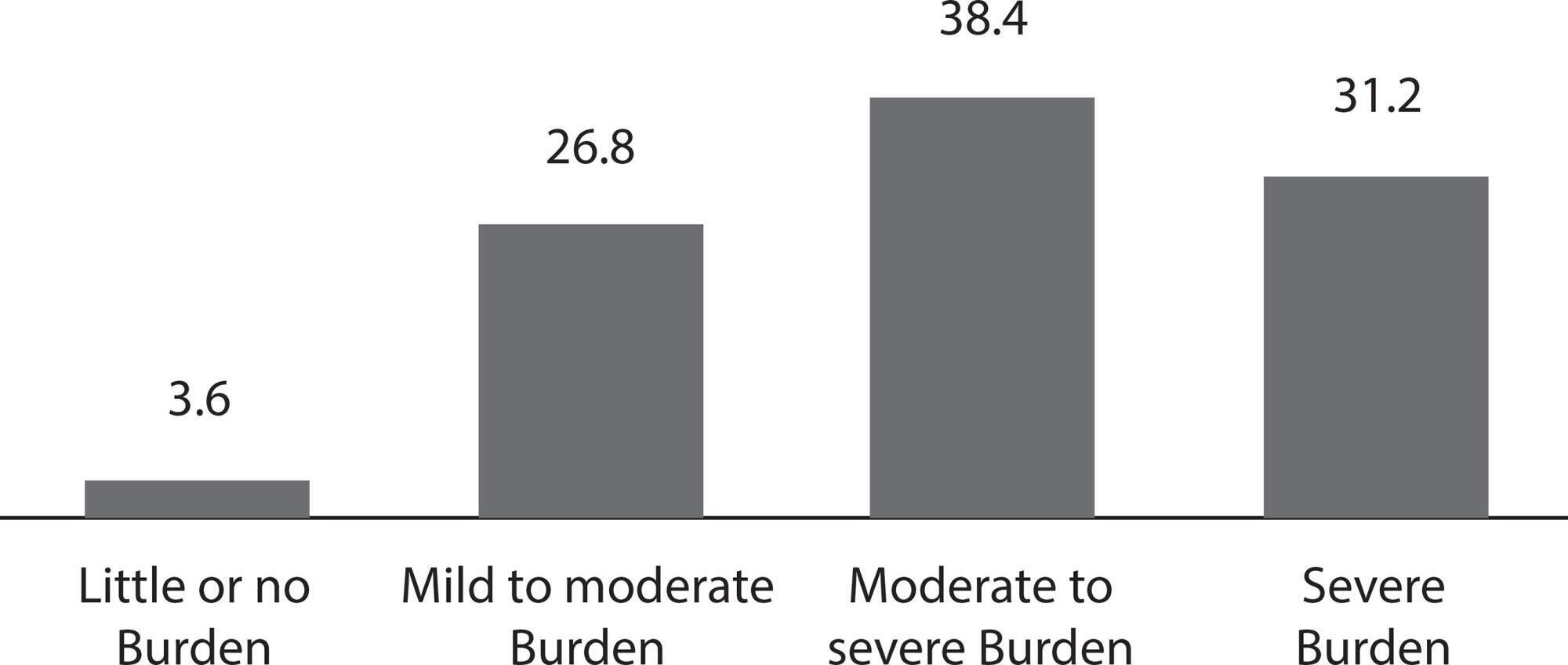
-
REFLECTION02-22-2021
Convergent care research and its qualification as scientific research
Revista Brasileira de Enfermagem. 2021;74(1):e20190657
Abstract
REFLECTIONConvergent care research and its qualification as scientific research
Revista Brasileira de Enfermagem. 2021;74(1):e20190657
DOI 10.1590/0034-7167-2019-0657
Views0See moreABSTRACT
Objectives:
to highlight the main attributes of Convergent Care Research that ratify it as a method of scientific research. Methods: it is a theoretical-reflective study on Convergent Care Research’s theoretical-methodological assumptions. Development: Convergent Care Research is compatible with the Social Constructionism paradigm. Convergent Care Research projects have two approaches: practical and conceptual. The Convergent Care Research process corpus contains five phases: conception; instrumentation; scrutiny; analysis and theorizing. Final Considerations: Convergent Care Research rigor encompasses the relationship between research and care practice, and this corresponds to the convergence of these two dimensions. Due to its theoretical foundation and criteria of methodological rigor, Convergent Care Research is aligned with scientific research methods.
-
ORIGINAL ARTICLE10-21-2019
Functional independence of elderly patients who fell: a follow-up study
Revista Brasileira de Enfermagem. 2019;72(6):1715-1722
Abstract
ORIGINAL ARTICLEFunctional independence of elderly patients who fell: a follow-up study
Revista Brasileira de Enfermagem. 2019;72(6):1715-1722
DOI 10.1590/0034-7167-2018-0845
Views0See moreABSTRACT
Objective:
to evaluate, in emergency hospital service and at home, the functional independence of elderly people who fell.
Method:
longitudinal study with 151 elderly. Functional Independence Measure (FIM) was used. Statistical tests were performed with univariate and bivariate analysis.
Results:
mean of total FIM value in the hospital was 70.4; and at home 84.3 (p <0.001). Independence was lower in the motor domain, in “self-care”, “mobility” and “locomotion” dimensions, in the two evaluations (p <0.001). Dependence reduced from 97.3% elderly in the hospital to 82.8% at home (p <0.001). There was a negative correlation between total FIM and age, number of medications, number of diseases and hospitalization time in both evaluations. Femoral and hip fractures were associated with lower total FIM values (p <0.001).
Conclusion:
the elderly had less independence in the hospital compared to at home, with greater impairment in the motor domain and “self-care”, “mobility” and “locomotion” dimensions, in the two moments evaluated.

-
ORIGINAL ARTICLE07-31-2020
Explanatory models of families of children with type 1 diabetes mellitus
Revista Brasileira de Enfermagem. 2020;73:e20180975
Abstract
ORIGINAL ARTICLEExplanatory models of families of children with type 1 diabetes mellitus
Revista Brasileira de Enfermagem. 2020;73:e20180975
DOI 10.1590/0034-7167-2018-0975
Views0See moreABSTRACT
Objectives:
to analyze how children with type 1 diabetes mellitus and their families explain the pathology, based on their understanding of the factors related to the discovery of diabetes, the etiology, treatment, and prognosis of the disease.
Methods:
qualitative methodological approach, based on medical anthropology and the narrative method. In-depth interviews were conducted with 12 families of children with type 1 diabetes mellitus attending follow-up consultations at a specialized center. The statements were subjected to inductive thematic analysis.
Results:
the explanatory models identified describe the families search for the clarification of the signs and symptoms that the child had. Faced with the disease, families reorganized themselves to meet new health care needs of children, such as adequate nutrition, physical exercise, and blood glucose monitoring.
Final Considerations:
knowing the explanatory models allows the understanding of how families give meaning to the child’s illness, favoring daily nursing care and an effective control of the disease.
Search
Search in:
Nuvem de Tags
Adolescente (85) Atenção Primária à Saúde (239) COVID-19 (91) Criança (91) Cuidados de Enfermagem (269) Educação em Enfermagem (151) Educação em Saúde (139) Enfermagem (930) Enfermagem Pediátrica (86) Estudantes de Enfermagem (77) Estudos de Validação (131) Família (87) Idoso (208) Promoção da Saúde (99) Qualidade de Vida (104) Saúde do Trabalhador (86) Saúde Mental (145) Saúde Pública (82) Segurança do Paciente (150) Tecnologia Educacional (100)



